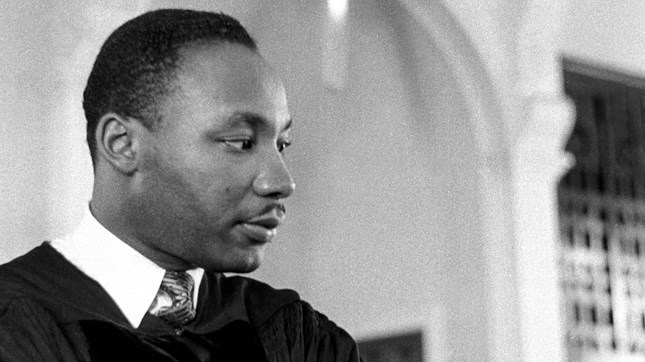Skill Builders
Article
King’s Pulpit

Armed with a handful of warmed-over sermons and big dreams to grow a small church, the newly ordained Rev. Dr. Martin Luther King, Jr. arrived at Dexter Avenue Baptist Church in Montgomery, Alabama in May of 1954. According to biographer Richard Lischer, King came to Dexter with a 39-point plan. Included in King's plan was the purchase of a new pulpit. The two pulpits the church currently owned—one in the sanctuary and the other in the basement for use in Sunday School—had both been there since the last brick was laid at Dexter in 1889.
Within a year of arriving, King was the recognized leader of America's protest for civil rights. Soon, America was marching for change. King had become more than the pastor at Dexter, but he never stopped preaching. In fact, he believed the church was the center for necessary, creative, and loving change. King’s speeches, the secular sermons that soared at state houses and national monuments were born in the pulpit.
The Civil Rights Movement, King’s vision of America, was preached into existence. The laws needed to change, yes, but the vision was launched from behind worn and weathered pulpits.
Nearly a decade ago, I toured Dexter Avenue Baptist Church along with twenty other ministers from my denomination. Ten of us are white; ten are African-American. We believed then, and believe now, that race is an issue in our churches and country.
Only the willfully blind and utterly ignorant could deny it? From bursts of outrage and explosive responses over the shooting of Walter Scott by Michael Slager to six Asian women killed in Atlanta to Dylan Roof's insanity-fueled mass-murder at Emanuel African Methodist Episcopal Church to garish and schismatic rhetoric regarding immigration; racial tensions still texture and distort American life.
And it's past time for pastors to preach a new America into existence. It’s time for pulpits to matter again.
Preaching Reconciliation
Christians of all varieties should join Dr. King in embracing what the Apostle Paul called, “the ministry of reconciliation.” When faced with racial divisions, the writers of the New Testament claimed Jesus as the one “who has made the two groups one and has destroyed the barrier, the dividing wall of hostility” (Eph. 2:14). The heart of the Christian life is extending the reconciliation we have through Jesus so others may be reconciled both to God and one another.
Reconciliation is the sub-structure of Christianity. It was Jesus who said, “Love your enemies and pray for those who persecute you,” and he didn't mean to pray for their demise—that's a curse, not a prayer. As we preach Christ, we can ill-afford the pettiness, protections of privilege, and partisanship that rips the fabric of American life.
Spiteful words, knee-jerk reactions, social media posts that carve the world into “us” vs. “them,” and sermons fueled by half-truths about “those people,” work against the ministry of reconciliation. Pastors betray the gospel when we extol the virtues of the walls Jesus’ ministry was designed to tear down (Eph 2:14-15).
God desires our freedom from sin and urges us to reconcile because God loves our neighbors, even when we don’t. Cultural, ethnic, and racial divisions are not simply a breakdown of government or culture. It is a dismissal of the gospel. The perennial question is now what it has always been: Is your preaching tearing down walls or erecting them?
The Power of the Pulpit
Dr. King never got his new pulpit. The seeds of the Civil Rights Movement blossomed too quickly, and like most old furniture in churches, the deacons decided the gear they had was good enough. It turned out the power of King's pulpit was not found in novel oak or polished mahogany, but in awakening the imagination of gospel reconciliation in his own time and setting.
After marching from Selma to Montgomery in 1965, King found Dexter Avenue’s basement pulpit plenty sturdy. Standing behind Dexter’s pulpit, foot-worn and fatigued, King called “clergymen and laymen of every race and faith” to pilgrimage together.
The reconciliation preached at Dexter Avenue Baptist Church became the reconciliation preached at the base of the Alabama Capitol’s steps. It was a journey of a million strides, though geographically Dexter Avenue and Alabama’s Capitol building are only steps apart.
What if this is the way America becomes a more beautiful, godly, equal, just, and reconciling place, by pastors demanding it?
Sean Palmer is the Teaching Pastor at Ecclesia Houston, speaker and speaking coach, and author of several books including--Speaking by the Numbers: Ennegram Wisdom for Teachers, Pastors, and Communicators.











